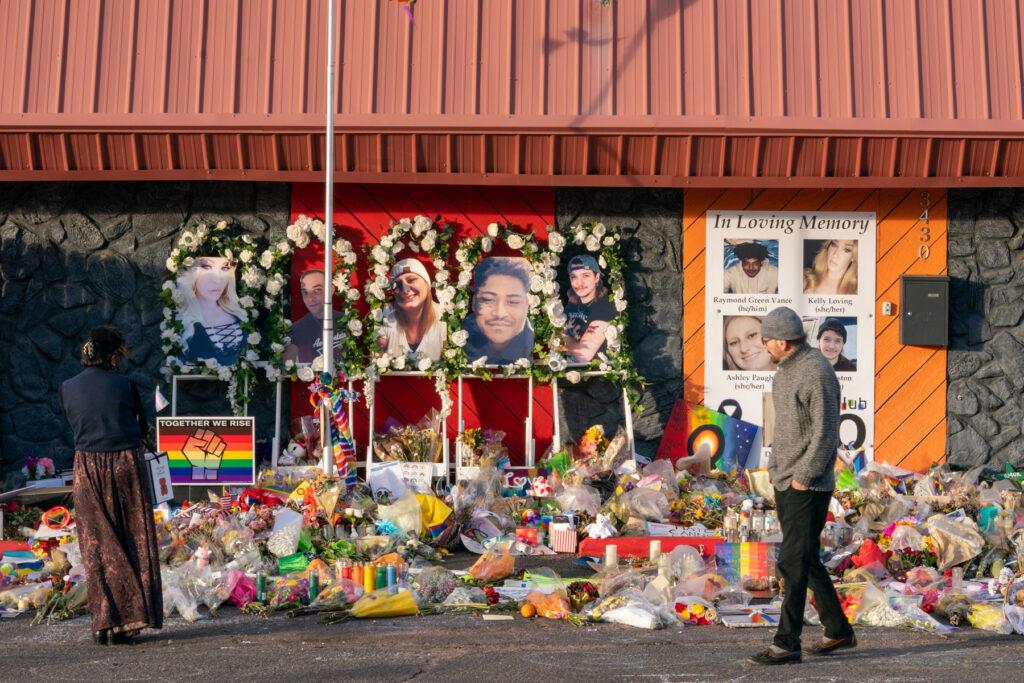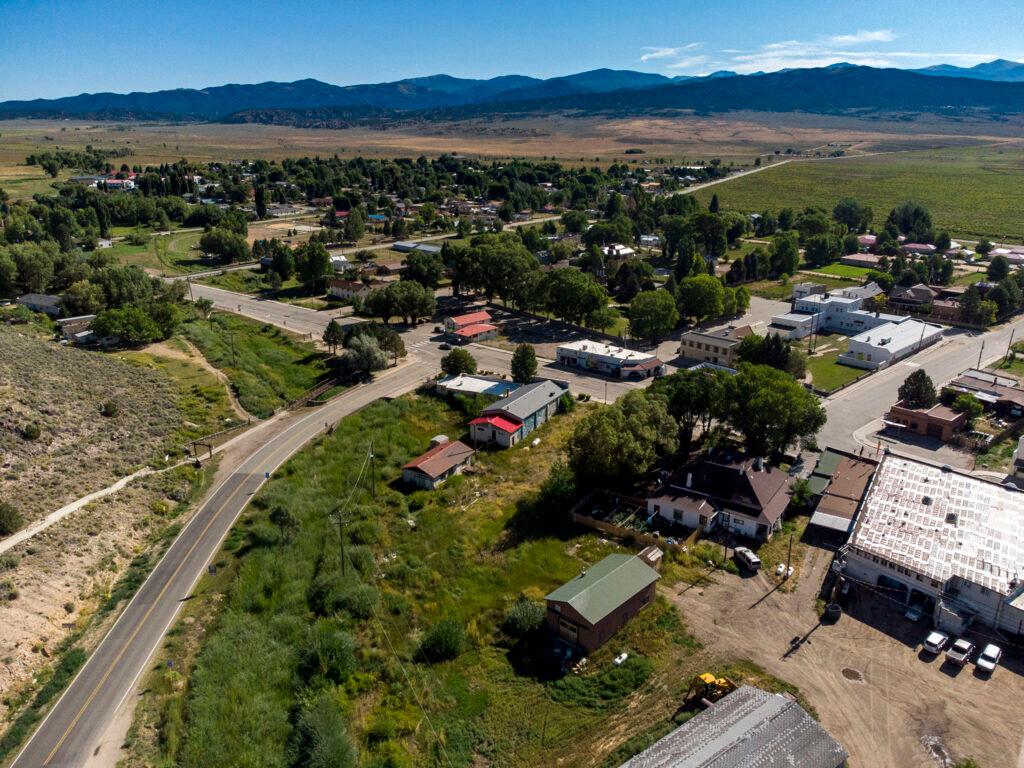
Editor's Note: This story contains mentions of suicide and descriptions of violence.
Sitting in the common room of her condo building in the Denver area, a woman recalled the moment that she decided to do something. Her partner, she said, had just threatened to take his own life — and then, chillingly, told her that he would shoot her too.
“You could tell by the tone in his voice, his eyes — like, the way that they looked,” she said, seemingly transported to that moment from more than a year earlier. “His entire demeanor was so clearly psychotic.”
They were at the end of what she described as a long and abusive relationship — and the beginning of a legal fight that would eventually lead to a local courtroom, where she convinced a judge to temporarily take his guns away.
The former couple are among the first people to go through Colorado's new “red flag” process, which allows courts to remove firearms from people deemed a threat to themselves or others.
The experience gave her a measure of power over a terrifying situation, she said, but it also left her disillusioned. Her story and others show just how difficult it can be for a private citizen to pursue an “extreme risk” petition — especially when local police aren’t helpful. It’s a situation playing out all across Colorado. In some cases, police simply aren’t familiar with the new law, or may be hesitant to use it. In others, the authorities are intentionally avoiding it.
“I was backed into a corner and was given no choice because of the failed justice system and court system that protects themselves and not the people,” the woman said.
At the woman’s request, CPR News is withholding all names and identifying details involved in the case in order to protect her safety. The account she provided matches what she told a court in signed papers under penalty of perjury, and we confirmed details through direct documentation she provided where possible.
People across Colorado have struggled to get help with ‘red flag’ cases
Colorado’s Extreme Risk Protection Order law passed in 2019 and took effect in 2020. It can require someone to surrender their weapons — and bans them from buying new ones — for up to a year at a time.
At the time of the former couple’s case, the ERPO law had been in effect for more than a year, and it had been used fewer than 150 times statewide. Overall, Colorado’s implementation of the law has been relatively slow, with courts issuing gun bans far less often than in several other states, such as Florida.
| If you or someone you know is in crisis or looking for mental health services, call the Colorado Crisis Services hotline at 1-844-493-8255, or text “TALK” to 38255. |
CPR News' reporting shows that part of the reason has been a lack of action by local police and sheriff’s agencies.
The woman said that when she met with a Lakewood Police Department agent, she brought video of her former spouse pointing a gun at himself, and screenshots of text messaged threats.
But the agent didn’t see enough evidence to pursue a red flag order, according to a Lakewood police spokesman.
Instead, the officer suggested a wellness check — which the woman declined, fearing it would only anger the man.
The officer, she recalled, told her: “At this point, we've done all that we can do. Best of luck.”
There was, however, another option.
The woman realized that she herself could file a red-flag petition, rather than relying on law enforcement. The ERPO law allows close relations and household members to file petitions against allegedly dangerous people.
“OK. I have to go to the Jefferson County courthouse,” she told herself.
A more difficult path
Setting off on her own would be a significantly harder path, according to CPR News’ analysis of hundreds of case files.
Individuals like her are far less likely than police officers to succeed with red flag petitions. Only about 17 percent of requests filed by private citizens result in a gun removal order for the full one-year period allowed under ERPO. In comparison, more than 80 percent of law enforcement petitions are successful, CPR News found.
Part of the reason for the low success rate is the difficulty of navigating the courts and understanding how the law works. The woman first found herself bounced between two different court districts, with representatives of each telling her to file the case in the other.
“I'm ping-ponging all over the place here,” she recalled, laughing before turning serious again: “I said (to a court official): ‘Are you gonna be at the funeral, apologizing to my kids?’”

Finally, she confirmed that she should file the case in the jurisdiction where the man lived, rather than where she lived herself. And after several hours in the courthouse, she was able to submit a petition and show her video evidence to a judge.
The judge signed a temporary red flag order, forcing the man to give up his guns for two weeks. Lakewood Police Department seized the weapons, they said. And a few weeks later, at a full hearing, the judge ordered him not to purchase or possess guns for another year.
Though she was successful, the woman was left to wonder: How were other people managing this complex process without police help?
“I'm not a lawyer, but compared to the average person, I’m fairly knowledgeable of laws and the judicial process,” she said. And even so, “it was just very, very lonely.”
And throughout those days, her ex’s words echoed in her head. She said he had often told her: “They're not gonna help you… I could do anything I wanted to you. They're not gonna help.”
Hesitance, resistance and lack of knowledge
Though they didn’t file a petition in this case, the Lakewood Police Department supports the use of ERPO, said Commander Jon Alesch.
In fact, the city force has become one of the strongest adopters of the law in Colorado. To date, the agency has filed at least nine ERPO petitions, more than any other department except the much-larger Denver Police Department, according to court records. Lakewood has assigned a special team and trained its agents to recognize ERPO cases, he said.
“We've done more than almost anyone except for Denver. So we're not afraid to use them and we actually believe in the model,” Alesch said.
In other areas, though, it’s a different story — with some law enforcement leaders intentionally avoiding filing red flag orders due to Second Amendment concerns.
| Do you want to share your experience with Colorado’s ERPO law? Email the reporter, Andy Kenney, at [email protected] and let us know if you would like to remain anonymous. |
In response to the law’s passage in 2019, dozens of counties declared themselves as “sanctuaries” or “preservation counties” for the Second Amendment and pledged to limit their use of ERPO.
That can make it difficult for survivors of abuse to pursue an ERPO petition, said Katie Wolf, public policy director for Violence Free Colorado, a coalition that aims to end domestic abuse.
“Survivors are much more likely to participate in these systems if they know what to expect. And so the fact that you don't know whether or not the sheriff is gonna believe you or the judge is going to believe you — or whether or not they believe in the law — that's a concern,” Wolf said.
“It's not just in domestic violence of course, but suicide and other violent crimes where it can really save lives,” Wolf added.
In El Paso County, former sheriff Bill Elder said in 2020 he would only use the law in limited cases, and District Attorney Michael Allen derided the red flag law in 2019 as “[n]othing more than a way to justify seizing people’s firearms under the color of law.”
El Paso County authorities came under harsh criticism for those positions after the Club Q shooting. The suspect had previously allegedly threatened a mass shooting and engaged in an armed standoff with police, but no one filed a red flag petition. The sheriff’s office has defended that decision, noting that they confiscated and kept the suspect’s guns during the earlier criminal case. However, a red flag order also would have barred the suspect from buying new guns.

Officials with the El Paso County Sheriff’s Office and Colorado Springs Police Department did not respond to multiple interview requests.
Judges and police are reluctant: ‘They have rights to be left alone’
Law-enforcement reluctance may be a factor in lower profile cases too.
In Costilla County last year, a woman filed a red flag petition against a former romantic partner. In a court filing, she claimed the man had threatened to commit “suicide by cop,” and made other threats, the petition claimed.
But the case met little interest from local authorities, according to two friends of the petitioner who tried to help her with the situation. The friends asked to be identified only by their middle initials, M. and A., for fear of violence.
When the petitioner spoke to a sheriff’s deputy last fall, they were told the Costilla County Sheriff’s Office wouldn’t help them file a red flag petition, the friends said
The deputy told them that Sheriff Danny Sanchez “takes Second Amendment rights really seriously, and doesn’t like to put in these petitions,” M. said. “We were like, ‘Yes, but also what should be taken seriously is this woman telling you that she's been threatened and that he's threatened others.’”
The Costilla County Sheriff’s Office has never filed a red flag petition, according to a CPR News analysis that covered all cases through mid-November 2020.
The office prefers that family members file the cases directly, said Undersheriff Cruz Soto.
“We don’t know exactly what’s going on in the household. We think it’s a lot better for the family members to do that. They can explain much more in depth what it is they’re asking,” Soto said.
“It’s still a touchy subject,” Soto said of the idea of restricting Second Amendment rights. “I think that to just go in and take somebody’s firearms, we want to make sure that we 100% are in the right in doing so. We’d hate to do it based off hearsay.”
The department has no written policies on ERPO, but may develop some, Soto said. The office will consider running an ERPO case if the person’s family isn’t capable, Soto added, but “we’re not trying to go crazy on it.”

Months after the alleged threat, the woman in the Costilla County case learned she could file the petition herself, without help from the sheriff’s office. But when she finally did, district court judge Crista Newmyer-Olsen rejected it the same day it was filed, court records show.
According to A.’s notes from the hearing, the judge said that the petition was simply too late. About five months had passed since the alleged threats.
“There is nothing that indicates that (the man) has done anything other than make these threats, at least since July,” the judge said, according to the notes. “I don’t want you to feel that I am discounting what has happened to you, because it is very real.”
The petitioner told the judge that they had raised the case because they didn’t want to be complacent after the Club Q shooting, but they were scared to contact the man directly to see how he was doing. They similarly asked that CPR News not contact the respondent for fear of reprisals.
“I don’t think that any of us would feel comfortable sending somebody down to assess his mental status. I think that is for a professional to do,” the petitioner told the judge, according to A.’s notes.
The judge reportedly responded: “Well, the reality… is that people have constitutional rights. They have rights to be left alone if they want to, if they are isolating and not causing problems,” according to A.’s notes.
ERPO is sometimes “very appropriate,” the judge said, but courts must be careful.
According to A.’s notes, Judge Newmyer-Olsen concluded her remarks: “Especially in light of the increase in mass shootings, I think it was the right thing for you to take the precaution and to bring it to the court's attention. I am glad that it’s being brought to the attention of law enforcement. If something happens, they will be aware of these incidents.”
The judge has handled at least five ERPO cases, according to a CPR News review of cases, ordering gun bans in several of them.
A ‘last resort’
Ultimately, the fate of a “red flag” case can vary greatly depending on where it begins. Police in Denver are far more likely to assist in a case, while the same request might go ignored elsewhere.
And when they do get in front of a judge, cases may be graded on starkly different criteria. Some judges say they’ll only issue an order if a person has direct access to guns — not just if there’s a concern they’ll buy one. Others set different timelines for what constitutes an actionable threat.
Another survivor of domestic violence told CPR News that the lack of clarity in the ERPO process was maddening: “When you're just trying to get through the day and hopefully not get shot, it's hard to try to figure out those little details.”

And even when they succeed, some petitioners are left unfulfilled. The woman who filed the Jefferson County case was proud that she stood up for her and her children’s safety. But she has strongly mixed feelings about the justness of the law itself.
Politically, the woman described herself as conservative. Even though she sought an extreme risk order, she believes they are fundamentally an unconstitutional infringement of gun rights, and that the law is prone to abuse.
The red flag law “depends on the judge, it depends on the county, it's so arbitrary,” she said. “That's unconstitutional.”
The woman allowed the red flag order to lapse a year later, fearing that it would ultimately do little to stop her ex if he wanted to harm her.
She would rather see cases like hers handled by the criminal laws against making threats, or by committing people to inpatient psychiatric care, which may also block their legal right to buy guns.
Supporters of the red flag law counter that gun-removal orders are a fast and effective way to keep people safe. Other family members who have pursued petitions told CPR News that they felt profound relief after completing the process. Studies of the effects of ERPO laws on overall rates of violence are still pending, but gun-violence researchers say that the early results are promising.
“You have safety from firearm violence very quickly, and you're not waiting for a whole criminal justice system to work,” said April Zeoli, associate professor at the Institute for Firearm Injury Prevention at the University of Michigan, who has studied hundreds of “red flag” cases. “You're waiting for a civil court judge to make one decision.”
In the end, despite her reservations, the Jefferson County petitioner said that she would do it all again. The red flag law, she explained, had been her only choice.
Explore our 'red flag' series
- How Colorado lawmakers want to change the ‘red flag’ gun law — or not
- What one ‘red flag’ case in Denver says about how the city removes guns
- Are mass shootings being stopped by Colorado’s ‘red flag’ law?
- ERPO in 8 charts: What we learned from reading hundreds of ‘red flag’ cases in Colorado









